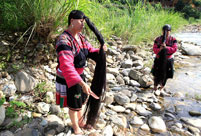

SEOUL, Aug. 25 -- South Korea plans to provide compensations in cash for "comfort women" victims, a euphemism for Korean women forced into sex slavery for Japanese military brothels before and during World War II, despite flat rejections from the victims demanding legal reparations.
Seoul's foreign ministry was quoted by Yonhap news agency as saying on Thursday that "comfort women" victims will be provided with 100 million won (about 90,000 U.S. dollars) per person in cash for survivors and 20 million won for the dead.
Necessary money will be financed by funds scheduled to be offered by the Japanese government as early as this month under the Dec. 28 agreement that was reached late last year between South Korea and Japan.
Seoul and Tokyo signed a "final and irreversible" agreement on Dec. 28, 2015 to end the prolonged dispute over "comfort women". Under the agreement, Japan pledged to pay 1 billion yen (about 8.3 million U.S. dollars) from its state coffers to build a foundation for the South Korean victims.
The Foundation for Reconciliation and Cure was launched a month earlier in the form of a non-profit organization under Seoul's foreign ministry.
The launch came despite strong oppositions from living "comfort women" victims and their advocacy groups, who have demanded legal reparations rather than consolatory compensations as the reparations can only have a meaning that Japan acknowledges a forcible recruitment of the victims.
Japanese Prime Minister Shinzo Abe expressed his apology and remorse through the Dec. 28 agreement, but he and his cabinet have denied any forcible recruitment of sex slaves by Japanese government or military during the devastating war.
One of living "comfort women" victims was quoted by Yonhap as saying that she will not receive any funds as it does not mean legal reparations. The 89-year-old demanded Abe's direct apology and legal damages.
Another 90-year-old victim said she will never receive Japan's"dirty money," expressing her flat rejection to the compensations from Japan that has yet to acknowledge its past brutalities under the 1910-45 Japanese colonial rule of the Korean Peninsula.
Historians say that as many as 200,000 women, mostly from the Korean Peninsula as well as from China and Southeast Asian nations, were coerced into sex enslavement for Japan's Imperial Army during World War II.
Only 40 are still alive among 238 South Korean victims who identified themselves as former sex slaves.
Advocacy groups have claimed that the foundation and the South Korean government have no legal rights to receive money on behalf of the victims as the constitutional court ruled in 2011 that the victims have legal rights to lodge damages claims against the Japanese government.
The victims have never delegated such rights to the South Korean government or the foundation.
Separately from the government-led foundation, South Korean civic groups launched a foundation for the victims in early June with voluntary donations and contributions from more than 100,000 people.
More than 1 billion won (about 900,000 U.S. dollars) was raised through the voluntary participation that began in late 2015.
The private foundation plans to carry out various projects to restore the dignity and honor of comfort women victims and to encourage future generations to remember the militaristic Japan's atrocities. Enditem
 World's fastest bullet train to start operating next month
World's fastest bullet train to start operating next month Huangluo: China's 'long hair village'
Huangluo: China's 'long hair village' Spectacular bridge with one of the tallest piers in the world
Spectacular bridge with one of the tallest piers in the world Magnificent view of Hukou Waterfall
Magnificent view of Hukou Waterfall A glimpse of Stride 2016 Zhurihe B military drill
A glimpse of Stride 2016 Zhurihe B military drill US Navy chief tours Liaoning aircraft carrier
US Navy chief tours Liaoning aircraft carrier Chinese American woman wins Miss Michigan
Chinese American woman wins Miss Michigan Centenarian couple takes first wedding photos
Centenarian couple takes first wedding photos Traditional Tibetan costumes presented during fashion show
Traditional Tibetan costumes presented during fashion show Top 10 livable Chinese cities
Top 10 livable Chinese cities Top 20 hottest women in the world in 2014
Top 20 hottest women in the world in 2014 Top 10 hardest languages to learn
Top 10 hardest languages to learn China’s Top 10 Unique Bridges, Highways and Roads
China’s Top 10 Unique Bridges, Highways and Roads Corrupt officials come up with creative ways to avoidpunishment
Corrupt officials come up with creative ways to avoidpunishment Death of sick teacher highlights medical rights
Death of sick teacher highlights medical rights An increasingly active Panchen Lama is expected to mitigateDalai's influence
An increasingly active Panchen Lama is expected to mitigateDalai's influence Hugo Award-winning author Liu Cixin talks about the future ofChinese sci-fi
Hugo Award-winning author Liu Cixin talks about the future ofChinese sci-fiDay|Week